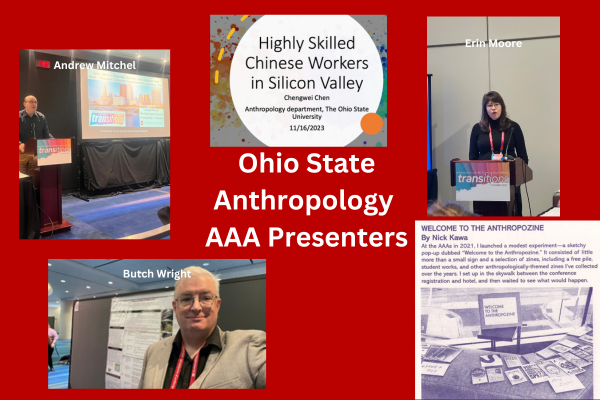American Anthropological Presentations Ohio State Anthropology

We are highlighting OSU participants at the American Anthropological Association Meetings in Toronto
Butch Wright
Between Two Worlds: Determining the Appropriateness of Standardized Instruments for Measuring Food Insecurity in a Multi-Ethnic Peri-Urban Indigenous Community in the Brazilian Amazon
Butch conducted Focus Group Discussions that examined both the language of the instrument and the forms of access to foods within the community to evaluate whether the standardized instrument utilized in Brazil adequately reflects the food insecurity situation within the community.
Chengwei Chen
Transnational Precarity: Identity, Adaption, and Intersectionality among Highly Skilled Chinese Tech Workers in California's Silicon Valley at a panel entitled Risk and Extraction: New Discussions of Labor Precarity.
This project, based on preliminary dissertation research with highly skilled Chinese immigrants settling in California's Silicon Valley, develops the concept of transnational precarity to capture this dynamic and the transience that emerges as they negotiate identity, labor and gender while becoming middle class. Transnational precarity encompasses intersecting marginalizing conditions that heighten insecurity, inequalities, and vulnerability and emerges from the contests that surround immigration status; the labor market; and gender identity. By engaging with community leaders, hometown groups, outdoor groups, and other interests, this project delves into the experiences of these workers and the dynamics of transnational precarity.
Nick Kawa
Welcome to the AnthropoZine! DIY Scholarship as an Alternative to the Peer-Reviewed Publication
Peer-reviewed publications remain the most accepted form of knowledge production and dissemination in academia today. But such formal publications are also deeply exclusionary, especially for undergraduate and early graduate students as well as scholars tackling highly stigmatized subjects. This presentation highlights the value of zines—do-it-yourself booklets that mix art and text in an eclectic assemblage—as a meaningful alternative. Drawing from my own DIY experiments with students and research collaborators, I make the case that zines offer several advantages compared to peer-reviewed publications. First, they are useful pedagogical tools that familiarize young scholars with the publication process, including guidance in composition, constructive feedback, and public dissemination. Second, they can serve to diversify anthropological scholarship by encouraging experimentation with text and image, as well as experiments in subject matter, voice, and literary form. Finally, because zines are self-published, creators exert considerable control over the production and distribution of the work that is shared—offering specific advantages from the standpoint of the political economy of knowledge production. You can view the zine produced by Dr. Kawa and the entire panel.
Erin Moore
Patient-Activists and the Interembodiment of Chronic Terror in the U.S. Insulin Crisis, Interembodiment Pnael.
At the protest, everybody’s bloodsugar was high. Adrenaline is known to spike glucose levels. It was the summer of 2021, and activists from several midwestern states had gathered at Eli Lilly’s Indianapolis headquarters to protest lethally high insulin prices. Aged 7-75, many of the protesters had type 1 diabetes, meaning they depend on insulin to live. While activists held signs urging Lilly to “make insulin free,” wearable diabetes tech alarmed, making sonic demands for more of the insulin Lilly and other pharma companies have made so profitable. From this scene of sickness, biocapitalism, and protest, I explore “interembodiment” among insulin affordability activists, a group that congeals at events like the Eli Lilly protest but primarily online, under the hashtags #insulin4all and #DOC (diabetic online community), and includes type 1s and their families, friends, and caregivers. Drawing Peter Sloterdijk’s work on atmosterrorism into conversation with disability anthropology, I consider how insulin affordability activists share and collectively combat embodied experiences of “chronic terror,” or the feeling that life is constantly, chronically under threat. Akin to “diabetes distress,” the increasingly used term for the presence of major depressive disorder as a diabetes comorbidity, chronic terror is an emotional response unique to the American healthcare cost environment. It gets under the skin, affecting bloodsugars as stress (adrenaline), which affects human-biotechnological configurations of care. By making space for expressions of chronic terror and developing methods for managing it, the insulin affordability movement allows patient-activists to redefine diabetes illness experience as they care for one another.
Andrew Mitchel
Taste, Décor, and Business Acumen: How Oaxacan Chefs Meet and Reshape Consumer Expectations in Columbus, Ohio. Foodscapes in Transition panel
Andrew explored how Oaxacan chefs in the city shape the food they produce, the imagery they utilize, and the business strategies they employ to consumer assumptions of good Mexican/Oaxacan food. He explored how chefs balance these consumer expectations with cooking their food.
Congratulations to our all participants!!
